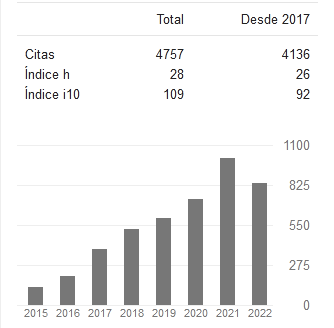IMPORTANCIA DEL TRABAJO COLABORATIVO PARA LA CONSTRUCCIÓN DEL CONOCIMIENTO EN EL ÁREA DE MARKETING
Palabras clave:
construcción del conocimiento; técnicas de aprendizaje; trabajo colaborativo.Resumen
El presente trabajo es una investigación bibliográfica que tiene como objetivo la discusión y sistematización de los elementos, características, responsabilidades y principales técnicas del Trabajo Colaborativo que contribuyen a la construcción del conocimiento de los estudiantes universitarios en la carrera de marketing de la modalidad semipresencial. Se discute el rol del docente, se analizan casos en los que se implementó el aprendizaje colaborativo como estrategia para el aprendizaje y se presentan treinta técnicas específicas organizadas en cinco grandes categorías, de las cuales ocho se recomiendan para el trabajo académico de la carrera de Marketing de la UED-UTEQ.
Descargas
Citas
Álvarez, I. (2011). El aprendizaje colaborativo versión 2.0 (un análisis jurisprudencial realizado por futuros publicitas). IV Congreso Nacional de Innovación en Ciencias Jurídicas: Coordinación y planificación en los estudios de derecho, (pág. 732). Valladolid.
Barab, S., Thomas, M., Merrill, H. (2001). Online Learning: From Information Dissemination to Fostering Collaboration. Journal of Interactive Learning Research, 105-143.
Barkley, E. (2007). Técnicas de aprendizaje colaborativo. Madrid: Ediciones Morata.
Glinz, P. (2005). Un acercamiento al trabajo colaborativo. Revista Iberoamericana de Eduacaión.
Gros B. y Silva J. (2006). El problema del análisis de las discusiones asincrónicas en el aprendizaje colaborativo mediado. Revista de Educación a Distancia.
Gunawardena, C. N.; Zittle, F. (1997). Social presence as a predictor of satisfaction within a computer mediated conferencing environment. American Journal of Distance Education, 11(3), 8.25.
Gunawardena, Ch. N.; Lowe, C.; Anderson, T. (1997). Analysis of a global online debate and the development of an interaction analysis model for examining social, construction of knowledge in computer conferencing. Journal Educational Computing Research, 17(4), 397-431.
Hsu, Wei-Yuan (2002). Online education on campus: Atechnological frames perspective on the process of technology appropriation. Unpublished Doctoral. Thesis, University of London, London.
Jacobs, G., Siowck, G “Learning cooperative learning via cooperative learning: A sourcebook of lesson plans for the teacher education” Kagan Cooperative Learning, San Clemente, CA, 1995.
Johnson, R. T., & Johnson, D. W., Action research: Cooperative learning in the science classroom. Science and Children (24), 31-32, 1986.
Maldonado, M. (2007). El trabajo colaborativo en el aula universitaria. Laurus, 263
Maldonado, M. (2008). Aprendizaje basado en proyectos colaborativos. Una experiencia en educación. Laurus, Septiembre-Noviembre, 158-180.
Monereo, C. y Durán, D. (2002). Entramados. Métodos de aprendizaje. Edebé, 9.
Scagnoli, N. (2006). El Aprendizaje Colaborativo en Cursos a Distancia. Investigación y Ciencia, 39-47.
Descargas
Publicado
Cómo citar
Número
Sección
Licencia
Derechos de autor 2020 Marco Fernando Villarroel Puma, Wendy Diana Carranza Quimi

Esta obra está bajo una licencia internacional Creative Commons Atribución 4.0.
Usted es libre de:
- Compartir — copiar y redistribuir el material en cualquier medio o formato
- Adaptar — remezclar, transformar y construir a partir del material para cualquier propósito, incluso comercialmente.
Bajo los siguientes términos:
- Atribución — Usted debe dar crédito de manera adecuada, brindar un enlace a la licencia, e indicar si se han realizado cambios. Puede hacerlo en cualquier forma razonable, pero no de forma tal que sugiera que usted o su uso tienen el apoyo de la licenciante.
- No hay restricciones adicionales — No puede aplicar términos legales ni medidas tecnológicas que restrinjan legalmente a otras a hacer cualquier uso permitido por la licencia.













































